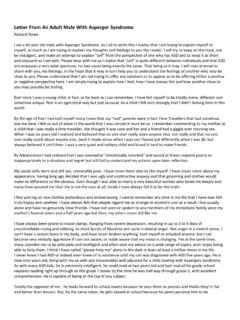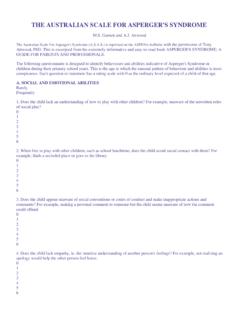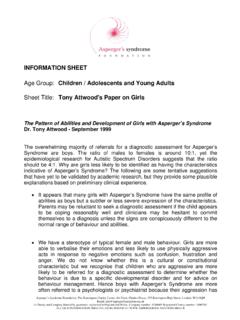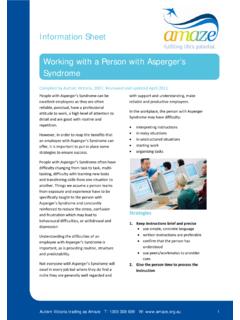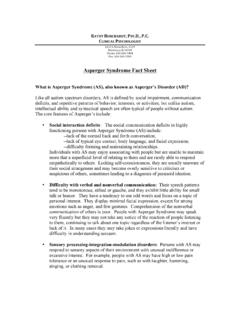Transcription of Table 1 Giftedness/Asperger’s Disorder Checklist …
1 Gifted child today 61 Giftedness and asperger s Disordercontinued on page ?? Table 1 Giftedness/ asperger s Disorder Checklist (GADC) Prereferral ChecklistGiftedAsperger s DisorderMemory and Attention__ Excellent memory for facts and information about a variety of topics__ Typically accurate recall for names and faces__ Dislikes rote memorization tasks although he/she may do it well__ Intense focus on topics of interest __ If distracted, is likely to return to a task quickly with or without redirection__ Superb memory for facts and detailed information related to selected topics of special interest__ Poor recall for names and faces__ Enjoys thinking about and remembering details, facts.
2 And figures __ Intense focus on primary topic of interest __ If distracted by internal thoughts, redirecting to task at hand may be difficultSpeech and Language__ Extensive, advanced vocabulary __ Communicates understandings of abstract ideas__ Rich and interesting verbal style __ Engages others in interests__ Asks challenging questions__ Expressive language/speech pattern of an older child__ Elaborates with or without prompts__ Understands and engages in sophisticated and/or socially recipro-cal humor, irony, and sarcasm__ Understands cause/effect or give and take of conversation__ Able to communicate distress verbally__ Advanced use of words with lack of comprehension for all lan-guage used__ Thinks and communicates in concrete and literal terms with less abstraction__ Uninviting verbal style__ Style or content lacks reciprocity and engagement of others in their personal interests__ Repeats questions and information__ Pedantic and seamless speech __ Little or no elaboration with run-on speech__ Misunderstands jokes involving social reciprocity__ Has difficulty understanding give and take of conversation__
3 Communicates distress with actions rather than wordsSocial and Emotional__ Able to identify and name friends; enjoys high social status in some circles__ Aware of social norms__ Keenly aware that he/she is different from peers__ Spontaneous sharing of enjoyment, activities, interests, or accomplishments __ Engages others in conversation__ Aware of another s perspective and able to take and understand others viewpoint__ Follows unwritten rules of social interactions__ Shows keen social insight and an intuitive nature__ Usually demonstrates appropriate emotions__ Aware of others emotions and recognizes others feelings easily__ Able to read social situations and respond to social cues __ Shows empathy for others and able to comfort a friend in need__ Demonstrates significant difficulty and lacks understanding of how to establish and keep friends__ Indifferent to social norms of dress
4 And behavior__ Limited recognition of differences with peers __ Little or no interest in spontaneous sharing of enjoyment, activi-ties, interests, or accomplishments__ Shows significant difficulty initiating or engaging others in conversation__ Assume others share his/her personal views__ Unaware of social conventions or the reasons behind them__ Lacks social insight__ Demonstrates inappropriate or immature emotions and flat or restricted affect__ Limited recognition of others emotions__ Misreads social situations and may not respond (or even know how to respond) to social cues __ Does not typically show empathy or concern for someone in needBehavioral__ May passively resist but will often go along with change__ Questions rules and structure__ Stereotypical behaviors ( , hand or finger flapping, twisting, or complex body movements) not present__ When problems arise, he/she is typically distressed by them __ Actively or aggressively resists change.
5 Rigid__ Adheres strictly to rules and needs structure __ Stereotypical behaviors ( , hand or finger flapping, twisting, or complex body movements) are present __ When problems arise, parents or teachers are distressed by them while student may be unaware of distressing situation unless per-sonally affectedMotor Skills__ Well-coordinated__ Interested in team sports__ Demonstrates appropriate development of self-help skills __ Lacks age-appropriate coordination__ Avoids team sports__ Delayed acquisition of self-help skillsNote. From Amend, Beaver-Gavin, Schuler, and Beights (2008).
